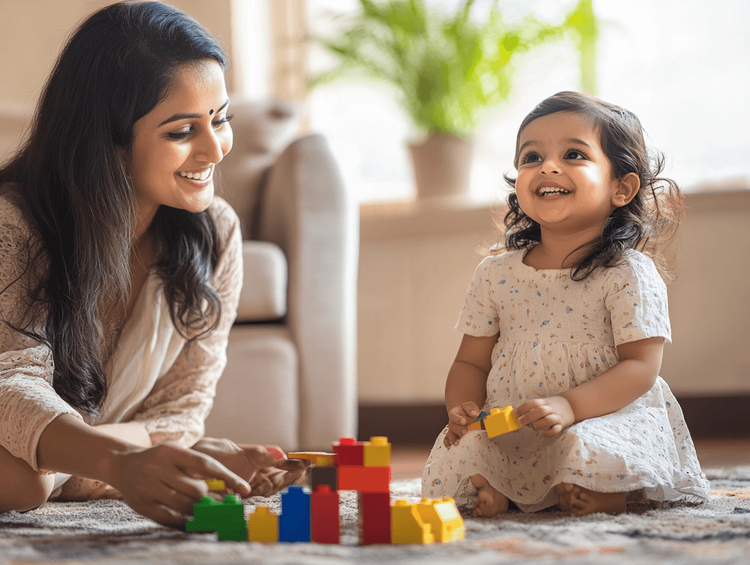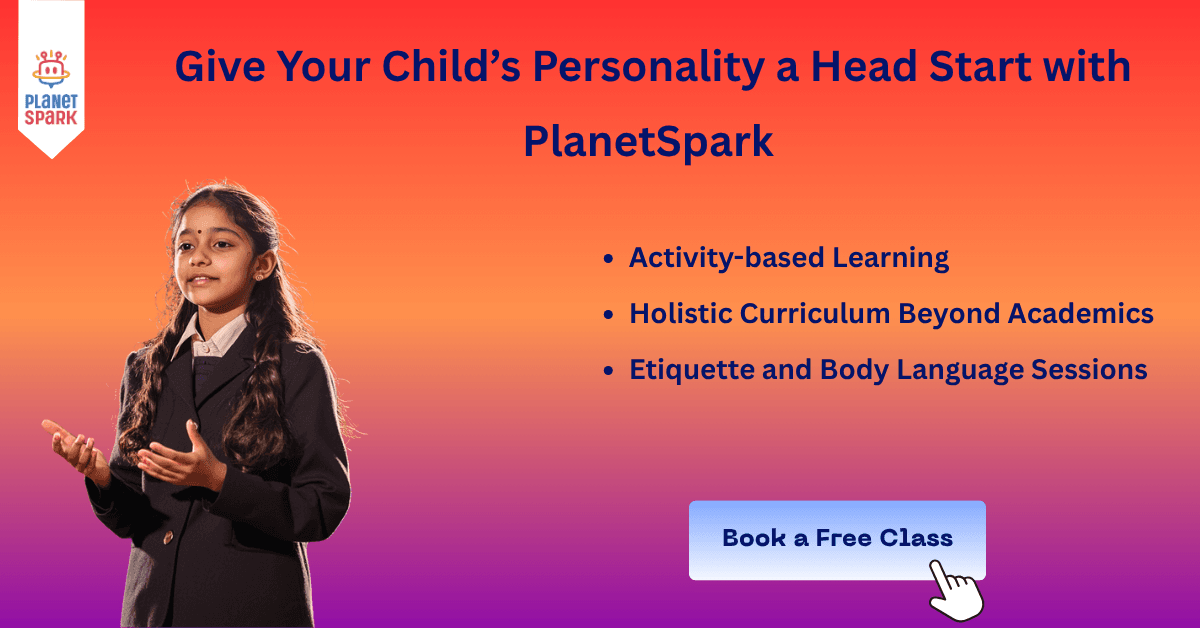Factors Influencing Personality Development in Kids

Table of Contents
Personality development is a lifelong process shaped by a variety of internal and external influences. From early childhood experiences to environmental interactions, numerous factors combine to define how we think, behave, and relate to others. Understanding these influences is not only important for personal growth but also critical in supporting children as they develop their unique identities.
This is where PlanetSpark’s Personality Development Courses come into play. Designed specifically for children and young learners, these programs focus on building key soft skills like confidence, communication, leadership, critical thinking, and emotional intelligence. Through interactive live classes, certified coaches, and AI-powered fluency tools, PlanetSpark empowers students to overcome stage fear, express themselves confidently, and thrive both academically and socially. Their unique approach blends role-playing, public speaking, and real-time feedback to nurture personality traits from an early age, laying a strong foundation for future success.
What Is Personality Development?
Personality development refers to the process through which an individual’s patterns of thought, behavior, and emotions evolve. This transformation is guided by both innate and external influences and continues throughout one’s life. For children, personality development is particularly significant as early experiences and education shape the kind of adults they will become.
According to a 2022 report by the American Psychological Association (APA), nearly 85% of personal traits are shaped by childhood experiences and environment, reinforcing the need for positive guidance during early years.
Why Is Personality Development Important in Children?
Children are most impressionable in their early years. The experiences, environments, and relationships they are exposed to during this time can deeply impact their personality development. Here’s why it's crucial:
- Foundation for Future Behavior: Early personality traits often extend into adulthood.
- Improves Social Skills: Children with well-developed personalities are better at making friends and resolving conflicts.
- Boosts Confidence and Self-Esteem: Helps children express themselves clearly and take initiative.
- Enhances Academic and Career Success: Traits like discipline, focus, and motivation influence long-term achievement.
Understanding what contributes to this development empowers parents and educators to provide supportive environments.
Key Theories Behind Personality Development in Children
Understanding the factors influencing personality development becomes clearer when explored through the lens of psychological theories. Over the decades, several renowned psychologists have proposed models explaining how personality takes shape during childhood and adolescence.
1. Erik Erikson’s Psychosocial Development Theory
Erikson emphasized that personality develops through eight stages of psychosocial conflict, each tied to a specific age range. For children, the most impactful stages include:
Trust vs. Mistrust (0–1.5 years)
Autonomy vs. Shame and Doubt (1.5–3 years)
Initiative vs. Guilt (3–5 years)
Industry vs. Inferiority (5–12 years)
Successfully resolving these stages helps children develop a strong sense of self, confidence, and resilience, traits vital to personality development.
“Children need the freedom and time to play. Play is not a luxury. Play is a necessity.” – Erik Erikson
2. Sigmund Freud’s Psychosexual Theory
Freud suggested that early childhood experiences, particularly those related to pleasure-seeking energies (libido), shape personality in five stages. While some aspects of Freud’s theory are debated, his emphasis on the importance of early experiences still holds weight in modern developmental psychology.
For instance, how parents manage a child’s behavior during the anal stage (1–3 years) can affect traits like orderliness, confidence, or anxiety in later years.
3. Albert Bandura’s Social Learning Theory
Bandura proposed that children learn by observing and imitating others, especially parents, teachers, and peers. According to him, modeling and reinforcement play critical roles in personality development. A child who sees empathy, cooperation, and confidence modeled at home or in the classroom is more likely to adopt these traits.
“Learning would be exceedingly laborious, not to mention hazardous, if people had to rely solely on the effects of their actions to inform them what to do.” – Albert Bandura
4. Jean Piaget’s Cognitive Development Theory
Though Piaget focused primarily on cognitive development, his work highlights how intellectual growth supports personality. For example, as children develop logical reasoning, they gain better control over emotions and behavior, forming key aspects of a well-rounded personality.
5. B.F. Skinner’s Behaviorist Theory
Skinner emphasized the role of operant conditioning, where behavior is shaped by rewards and punishments. In the context of personality, consistent positive reinforcement can nurture desirable traits like perseverance, politeness, and responsibility.

Why Understanding These Theories Matters
By grounding our understanding in these theories, we gain deeper insight into the psychological and environmental factors influencing personality development. These frameworks help parents and educators create supportive environments where children can thrive emotionally and socially.
In PlanetSpark’s Personality Development Courses, these expert principles are thoughtfully woven into lesson plans. Interactive role-plays, confidence-building exercises, and real-time feedback are all aligned with how children best learn and grow, ensuring holistic development.
Major Factors Influencing Personality Development
1. Heredity (Genetics)
Personality begins with the genetic makeup inherited from parents. Traits such as temperament, intelligence, and certain emotional patterns may be passed on. However, heredity sets the stage, and environment and experiences do the rest. Studies show that genetics may account for 20% to 60% of personality traits, depending on the trait.
2. Environment
Environment includes the people and experiences a child is exposed to, such as:
- Family atmosphere
- School culture
- Peer relationships
- Socioeconomic status
- Cultural background
A positive and nurturing environment fosters confidence, kindness, and resilience. According to research by the National Scientific Council on the Developing Child, a stimulating, emotionally supportive environment is essential for optimal brain development.
3. Education and Learning
Formal education and the way children are taught have a strong influence on their personality. Schools that promote creativity, collaboration, and critical thinking help children develop balanced personalities.
"There is in every child at every stage a new miracle of vigorous unfolding." – Erik Erikson
4. Parental Influence
Parents act as role models. Their behavior, communication style, discipline methods, and emotional availability directly influence the child’s character and habits.
"Children are not simply born but made by their parents’ child‑rearing practices." – Erik Erikson
5. Peer Influence
Friendships and peer interaction shape behaviors like empathy, teamwork, and social confidence. Encouraging children to engage in group activities can build interpersonal skills.
According to a study published in Child Development, peer influence becomes especially strong during adolescence and can significantly affect self-concept and behavior patterns.
6. Media and Technology
In today’s digital age, what children watch, read, and interact with online affects their thinking and personality. Guided media consumption is crucial. Overexposure to violent or unrealistic content can increase anxiety, aggression, or low self-esteem, while educational content can enhance vocabulary, creativity, and problem-solving.
7. Culture and Society
Cultural norms, traditions, and societal expectations frame how children behave and view the world. Exposure to diverse cultures enhances adaptability and empathy. For example, children raised in collectivist cultures may develop stronger group cohesion and emotional regulation, while those in individualist cultures may prioritize independence and self-expression.
8. Life Experiences and Challenges
Personal challenges, successes, failures, and changes (like moving or loss) impact emotional maturity and resilience.
"Resilient children are made, not born. The developing brain is most malleable and most sensitive to experience, both good and bad, early in life." – Dr. Bruce D. Perry
9. Birth Order
Though still debated, some researchers believe that firstborns, middle children, and youngest siblings may exhibit different personality traits due to family dynamics. Firstborns tend to be more responsible and achievement-oriented, while later-born children might be more sociable and adventurous.
10. Nutrition and Health
Good nutrition and overall health can support cognitive function, emotional balance, and energy levels, indirectly shaping a child’s behavior and mindset. Malnutrition, especially in early childhood, can result in delays in emotional and cognitive development.
11. Psychological Theories of Development
Freud’s psychosexual stages, Erikson’s psychosocial theory, and Piaget’s cognitive development theory all provide frameworks that explain how personality unfolds over time through stages of challenge and growth.
"What matters most in a child’s development… is whether we can help her develop a very different set of qualities, including persistence, self-control, curiosity, conscientiousness, grit and self‑confidence." – Paul Tough.
Expert Insights on Personality Development
Dr. Daniel Goleman, psychologist and author of Emotional Intelligence, emphasizes: “Children with high emotional intelligence have a better chance of becoming happy, healthy, and productive adults.”
Child development expert Dr. Laura Markham states: “Parents and teachers play an instrumental role in building a child’s sense of identity, emotional safety, and communication habits, key ingredients in personality development.”
How to Support Healthy Personality Development in Kids
Now that we know the factors influencing personality development, how can we as parents, caregivers, and educators contribute positively?
- Encourage Open Communication: Let children express their thoughts without fear of judgment. This builds confidence and emotional intelligence.
- Praise Effort, Not Just Results. Acknowledging hard work instead of only achievements fosters a growth mindset.
- Create a Positive Environment. Surround children with love, respect, and encouragement. Avoid harsh punishments and frequent criticism.
- Model Desired Behaviors. Children learn by observing. Practice kindness, patience, honesty, and responsibility.
- Promote Social Interactions. Team activities, playdates, and group learning sessions help develop leadership, sharing, and cooperation skills.
- Limit Negative Media Exposure: Guide what children watch and read. Encourage educational content, inspiring stories, and creative platforms.
- Introduce Mindfulness and Emotional Regulation: Help kids recognize and manage their emotions through mindfulness activities, journaling, and open dialogue.
Unlock your child’s true potential by enrolling them in PlanetSpark’s Personality Development Course. Book a free trial session today and see the difference.
How PlanetSpark Helps Shape Your Child’s Personality
At PlanetSpark, we understand that every child is different, and so is their personality. Our structured personality development courses empower children to become confident speakers, creative writers, and inspiring leaders. Here’s how:
1:1 Personal Trainers for Every Child
Every student at PlanetSpark is matched with a certified communication expert who delivers fully personalised, one-on-one live classes. These trainers:
- Understand your child’s learning style, pace, and personality
- Provide immediate feedback and guidance during sessions
- Focus on building skills like fluency, storytelling, public speaking, grammar, and creative writing
Personalised Curriculum and Learning Roadmap
We begin with a thorough assessment and create a roadmap that:
- Pinpoints gaps in grammar, vocabulary, fluency, and confidence
- Focuses on progressive growth, from sentence formation to public speaking
- Evolves with the child’s learning needs
SparkX – AI-Enabled Video Analysis Tool
Children upload their speeches and receive AI-analyzed feedback on:
- Voice clarity
- Grammar and sentence structure
- Confidence and stage presence
AI-Led Practice Sessions
Students can practise independently with AI support, helping reinforce speaking and storytelling skills with instant feedback.
Spark Diary
A digital journaling tool that:
- Encourages daily writing
- Builds consistency and creativity
- Enhances structured expression
Gamified Learning
Games like Grammar Guru Challenge and Spell Knockout make English learning fun, ensuring retention through play.
Regular PTMs and Progress Reports
Parents receive:
- Performance reports tracking public speaking, grammar, and confidence
- Trainer notes and targeted action plans
Learning Clubs and Sparkline
Kids join clubs like Debate, Podcasting, and Story Writing to collaborate and showcase skills. Sparkline, PlanetSpark’s safe content-sharing platform, lets them share their creations with peers.
Contests, Showcases, and Real-Time Recognition
Regular events provide:
- Certificates and stage exposure
- Peer encouragement and public performance experience
Social Proof: Over 1 million classes have been conducted on PlanetSpark with 95% parent satisfaction ratings. Students have gone on to win national storytelling, debating, and writing competitions.
Testimonial: “PlanetSpark completely transformed my daughter’s confidence. She used to shy away from speaking in class, but now she volunteers for speeches and debates!” – Shruti Mehra, parent of a 10-year-old
Why Choose PlanetSpark?
PlanetSpark offers tailored Personality Development Courses for children aged 4–15. The curriculum includes:
- Public Speaking
- Emotional Intelligence Training
- Leadership Activities
- Group Discussions
- Vocabulary & Voice Modulation
Not sure if PlanetSpark is right for your child? Join a free trial session and explore our interactive, engaging approach to personality growth.
FAQs: Factors Influencing Personality Development
1. What are the main factors influencing personality development?
The main factors include heredity, environment, education, parental influence, peer interaction, media, life experiences, and health.
2. Can personality change over time?
Yes, while some core traits may remain stable, personality can evolve based on experiences, education, and conscious effort.
3. How does PlanetSpark help in personality development?
PlanetSpark offers live classes focused on communication, confidence building, and leadership to support children’s personality growth.
4. Is personality more influenced by genes or environment?
Both play a role. Genetics provides a foundation, but environment, experiences, and learning have a major influence.
5. How can I help my shy child develop confidence?
Encourage small wins, celebrate efforts, and enroll them in supportive platforms like PlanetSpark’s public speaking programs.
6. Why is early personality development important?
Early years are formative and have a lasting impact on a person’s emotional, cognitive, and social behavior.
7. At what age is it best for personality development activities?
Ages 4–14 are particularly critical, as children are highly receptive to behavioral shaping and learning.
Personalized Communication Report
Record a video to get a AI generated personalized communication report for your child

Hi There, want to try these
tips for your child with
LIVE with our expert coach?
Let's check your child's
English fluency
